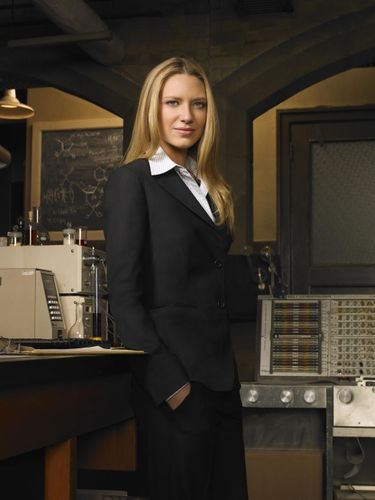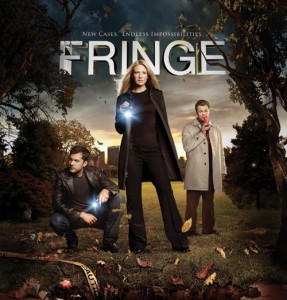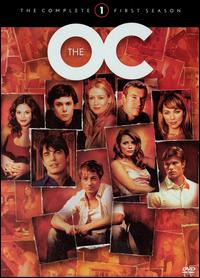I will watch any SF or supernatural television program at least once. Some stick, some don’t. I favour programs with female protagonists. I like queer stories or subtexts because they tend to fuck up the gender norms.
Besides the usual big names (Buffy, Dr Who), I am also into Bgrade stuff. Mostly because Bgrade stuff tends to be far more subversive, and that’s where you find the women protagonists. For all sorts of reasons. But apparently women don’t sell advertising, so we don’t see such great stuff from them in the Agrade programs. The ethnicity stuff is a bit of a fail (everyone is whitey mcwhite unless I’ve noted otherwise).
I tend not to remember the names of actors, but I like to read across programs, following a particular actor. I also tend to read all these programs as part of a broader metanarrative or general universe rather than as separate and distinct worlds. This is encouraged by the fact that many of these actors turn up in the other programs.
Lost Girl: 1 season, 2010. Canadian supernatural, female protagonist, sexual content (which of course is the predominant theme in many of these shows). Definitely B.
Story: woman hero (and female sidekick) work as ‘private detectives’ in the ‘fey’ world, which humans don’t know about. She’s trying to discover who her family is (she doesn’t really understand her super powers).
I don’t mind it because it looks quite good (in a ‘cinematic’ sense), has two female protagonists (one of whom turned up in Nikita once – I think she speaks Russian?) with a male werewolf love interest for the bisexual woman hero. That male love interest reads a little queer (though his character isn’t), or at least a little gender-flex (rather than solidly Super Straight Hegemonic Masculinity), which is nice. I’m still undecided about the gender politics in this one, though there are obviously some challenges in a sexualised succubus identity for the hero. I watch this one.
Blood Ties: 1 season, 2007. Canadian supernatural, female protagonist, sexy themes but not too sexy. Low production values.
Story: human private detective discovers supernatural world, begins to work with teh sexy vampire Henry Fitzroy solving supernatural crimes.
This one is important because it’s an adaptation of Tanya Huff’s Blood Books series, which is one of the best vampire series I’ve ever read, when Huff was really at her best (I think she’s a bit weaker these days). The female hero is excellent, and while the telly series doesn’t mention it, Huff’s characters are often bisexual or queer, which makes watching the telly series (within that context) a bit more interesting. The main actor has gone on to do other bits and pieces, mostly in crime shows like CSI.
Sanctuary: 3 seasons, including 8 webisodes. Canadian supernatural.
Story: ‘Sanctuaries’ are linked places where supernaturals are a) contained/held captive or b) educated (this bit is unclear and dodgy). These places are big ‘historic’ buildings, run by a team. There’s an international network of them. They solve ‘monsters of the week’ stories.
Female and male protagonists (three or four, depending on season), very decent gender politics. Season 2 introduces an Indian-American female character. A bit too much greenscreen special effects, and not really high-end stuff. A sort of swirly aesthetic that I find soothing when I’m ready for bed. The second season picked up the editing speed/tempo a bit. Less of the sexy stuff, more of the stronger female characters (the ‘boss’ is a centuries old woman scientist). Still Bgrade.
Moonlight: 1 season, 2007, American supernatural.
Vampires…. doing vampire stuff? I think the hero was… some sort of problem solver? Indolent rich? Who knows. This one is bad. I’ll stick with something really bad if the hero is female, but this hero (the actor is now the hero on Hawaii 5-O) is not good. Totally Bgrade, but with an Agrade aesthetic at times (in terms of special effects at least), and it was a struggle even for me to get through all the eps of this doomed program.
Vampire Diaries: You know this one. High production values, sometimes very, very poor scripting and acting.
Story: teenagers and vampires!
The second season started well with the way Caroline’s turning into a vampire was handled, but this hasn’t been sustained. There’s quite a bit of sex, which is a bit weird in a teenage character/high school setting, and the relationship between the brother vampires is ripe for a little slash fiction, even thought it’s a very straight show. Sometimes the show almost seems to be self-reflexive, and the ‘bad’ brother Damon assists this with his treatment. But it doesn’t quite get there. The best bit is having the ‘bad boy’ werewolf character from Wolf Lake as the ‘good’ brother Stephan. I think he’s actually a decent actor, though he struggles.
Wolf Lake: American supernatural from 2007, 1 season. Bgrade.
Story: ex-cop (Lou Diamond Phillips!) comes to small mountain town looking for his missing wife. Town is run by werewolves. He doesn’t quite discover their existence by the end of the series.
Hispanic protagonist! Tries to bring in some Native American subtext, but fails a bit. This is a weird mix of Twin Peaks and… some strange show set in a small rural town. It’s not consistent with its kooky Twin Peaks vibe and humour. Some sexy bits, some violence, but mostly laughable. It stars Stephan from Vampire Diaries, though, Lou Diamond Phillips, and a few other characters who turn up all over the place, including Phillips’ missing (werewolf) wife, who’s also in Vampire Diaries (as the sooky Stephan-girlfriend’s vampire mother). Dodgy special effects. Just didn’t quite work.
Demons: British supernatural, 2009, 6 eps of 1 season.
Story: basically Buffy with a teenage boy hero who’s descended from van Helsing and kills supernatural things.
This one is hampered by its bad acting (esp the hero), and I’m not all that interested in a male hero. The ‘mentor’ figure is played by that guy from Life on Mars who’s in all those British cop shows. I think he was miscast. I couldn’t finish watching even the 6 episodes. I’d say B, but the people who made this also made Merlin and Hex, and they have really good special effects and a glossy look.
Hex: British 2007, 2 seasons, supernatural.
Story: Witches and ghosts and teenagers and stuff.
Sexy, bit queer, except the queer character reads a bit too much like a thrill for male viewers – I was totally unconvinced. The other female protagonist is a rubbish actor. I just couldn’t handle this one, though my mum loves it. Despite the female protagonists, it’s genderfail. Bgrade, but with Agrade production values.
Supernatural: 6 seasons? You know this one too.
Story: 2 brothers travel around rural American south (sort of American gothic, but actually filmed in Canada I think) fighting monsters. More horror than supernatural, really.
Mainstream American telly. I quite like it, even though it has just about no women in it all, fails the Bechdel test. I like to watch it as though Sam and Dean are actually lovers with a rubbish relationship. They cry and talk about their feelings all the time, but they never kiss. Well, I haven’t caught them at it yet. Jensen Ackles is interesting because he was in ‘Dark Angel’, ‘Smallville’ and ‘Dawson’s Creek’, which are big teen shows. I like the way Supernatural plays on its wider fan discourse, including the slash fiction stuff. Total gender politics fail if you read it straight. Excellently queeraliciously genderfuck if you don’t. Not Bgrade at all.
Dark Angel: 2 seasons 2000, American supernatural/SF/post-apocalyptic whatever. Stars Jessica Alba. I like this one.
Story: Female protagonist who’s a bike courier in some post-apocalypitc city (Seattle?). She’s a clone or something, reads as kind of ethnic-flexi, has cat DNA mixed in with hers. She and some other kids escaped some corporate facility as kids and she’s constantly in hiding, looking out for searchers, though she has a job and pays rent in a dodgy apartment. Decent gender politics, except for the sexing up of the hero via the cat DNA – she ‘comes into heat’. The female protagonist has a lesbian housemate who has partners and the queer stuff is negotiated. I think this is actually an ok show, though it’s Bgrade.
Haven: American/Canadian coproduction, 2010 1 season (renewed).
Story: woman FBI agent goes to mysterious town where people have random (and usually uncontrollable) supernatural skills to find her mother/follow some mystery or something.
I love this one. She has a male partner (a local cop) who is suitably deferent to her leadership, but also has spine. He has a supernatural power (doesn’t feel pain), is good looking but not too good looking, and they have some really great unspoken sexual tension that could just as easily be platonic love and mutual respect. Their relationship is what makes this show for me. That and the amazing location. It’s Bgrade, the stories are silly, but I like it. It uses the ‘kooky rural town’ trope. Also stars that guy Eric Balfour who is kind of the Kevin Bacon of teen telly.
Eastwick: American 1 season 2009 supernatural.
Story: set in the Eastwick of the great film Witches of Eastwick, with three similar protagonists (same talents, etc), but with slightly different backgrounds, etc.
Genderfail, and undoes all the good work of the film. Okish special effects, Bgrade in execution, but intended as something more. Reminds me of Gilmore Girls in terms of setting. One of the few with a non-anglo protagonist.
Other programs that I watch, and which inform my reading of the above programs:
FRINGE!!!
Murdoch Mysteries (19thC police crime)
Hellcats (female athletes)
Veronica Mars (female teenage private detective teen)
Outcasts
Being Human (UK and US)
Misfits
Caprica and BSG
Sarah Connor Chronicles
Smallville (early series only)
Stargate Universe
True Blood
Dead Like Me
Pushing Daisies
Eureka
Warehouse 13
Heroes
Dr Who, Torchwood and Sarah Jane Adventures
Ultraviolet (British vampire/crime show)
Walking Dead
Buffy and Angel and Firefly
The Cape
V
Dollhouse (totally fucking gender FAIL and I hated it so much I had to stop watching. This show convinced me that Joss Whedon is actually fucked up RE gender stuff and that Buffy was a fluke we should attribute to Jane Espenson and other people NOT Whedon).
Nikita (a woman spy = supernatural in my book)





